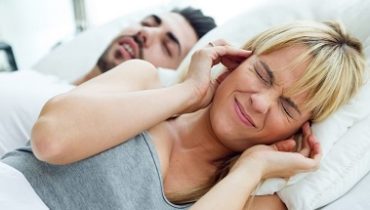
Snoring and Sleep Apnea
Sleep apnea is categorized as a sleep disorder that occurs when a person’s breathing is interrupted during their sleep. Beyond the disturbance to their bed partner’s sleep, sleep apnea is not something to shrug off. However, just because you snore does not mean you have sleep apnea.
When the tissues in your throat relax while sleeping, they reduce the space in your airway and cause a vibration. When this vibration occurs, the noise you hear is snoring. Several factors influence the frequency and volume of this vibration. The greatest indicator that your snoring may be a sign of sleep apnea is that it is loud and frequent.
Sleep apnea causes individuals to have pauses in their breathing and take shallow breaths. The greatest danger lies in the fact that these pauses can last for 10 seconds or more, leaving the body with a lack of oxygen. There are three different forms of sleep apnea:
- Obstructive sleep apnea: This is the most common form of sleep apnea that occurs when there is a blockage in the airway.
- Central sleep apnea: While there is no blockage in this form of sleep apnea, the brain sometimes forgets to send a signal to remind the muscles to breathe.
- Mixed sleep apnea: Mixed sleep apnea is a combination of Obstructive and Central sleep apnea.
Snoring, Sleep Apnea
While most people living with sleep apnea tend to be overweight, it can affect anyone. More than 18 million Americans suffer from sleep apnea, and many are unaware. Untreated sleep
apnea can affect everyday tasks such a job performance and driving ability. It can also cause a multitude of health problems including:
- High blood pressure
- Stroke
- Heart failure
- Diabetes
- Depression
- Headaches
- Intensify ADHD
What many people don’t know is that sleep apnea can also affect your oral health. People with sleep apnea tend to sleep with their mouths open, causing dry mouth. With a reduction in saliva, bad bacteria can build up and damage tooth enamel and increase the risk of infections to your teeth and gums.
People with sleep apnea also have an increased risk of teeth grinding. Not only does this negatively impact your quality of sleep, but it wears down your teeth. This again increases the risk of infections by creating tiny crevices where bacteria can grow.
Signs You Have Sleep Apnea
Unfortunately, many people are unaware they have sleep apnea, and that’s mainly because the symptoms could be indicative of other issues. The best way to find out if you have this sleeping disorder is by visiting your doctor. A doctor will then determine whether to diagnose you with a test you can take home or if you should visit a sleep disorder center. Some of the most common signs to look out for if you think you have sleep apnea include:
- Loud snoring
- Sore throat in the morning
- Lack of energy during the day
- Sleepiness while driving
- Morning headaches
- Restless sleep
- Forgetfulness
- Waking up multiple times during the night
- Insomnia
- Waking up due to gasping or choking
Treatment for sleep apnea will be based on the cause and your severity. This ranges from simple lifestyle changes to surgery. If you suspect you may have sleep apnea, schedule a visit with your doctor. A doctor will be able to determine what is best for you after an evaluation. You may just be able to put that snore to rest. Read more about Sleep Apnea and solutions
